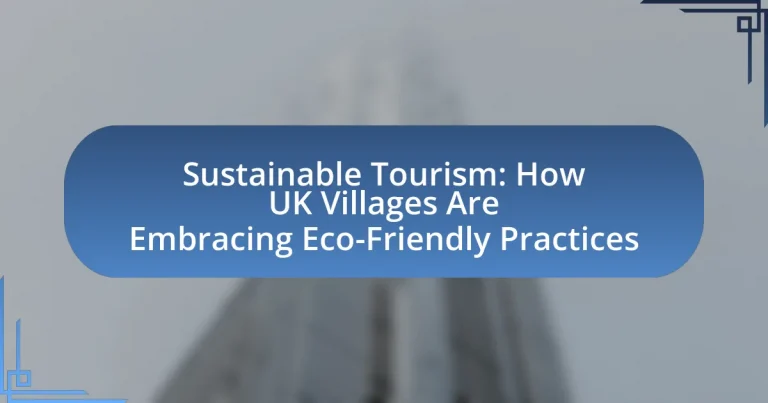Sustainable tourism in UK villages focuses on eco-friendly travel practices that prioritize environmental conservation, cultural preservation, and economic viability. This article explores the definition and principles of sustainable tourism, highlighting its environmental, social, and economic aspects. It examines the differences between sustainable and traditional tourism, the importance of community involvement, and the specific eco-friendly practices being adopted by villages. Additionally, it discusses the challenges faced in implementing sustainable tourism and the positive outcomes observed in communities that embrace these practices, ultimately demonstrating how sustainable tourism can enhance local economies and improve residents’ quality of life.

What is Sustainable Tourism in the Context of UK Villages?
Sustainable tourism in the context of UK villages refers to travel practices that prioritize environmental conservation, cultural preservation, and economic viability while minimizing negative impacts on local communities. This approach often includes initiatives such as promoting local produce, supporting small businesses, and encouraging visitors to engage in eco-friendly activities. For instance, many UK villages have adopted measures like reducing waste, conserving energy, and protecting natural habitats to enhance the visitor experience while safeguarding their unique heritage. These practices are supported by various organizations and government policies aimed at fostering sustainable development in rural areas, ensuring that tourism benefits both visitors and residents alike.
How is sustainable tourism defined and what are its key principles?
Sustainable tourism is defined as a form of tourism that meets the needs of present tourists and host regions while protecting and enhancing opportunities for the future. Its key principles include minimizing environmental impact, promoting local culture and heritage, supporting local economies, and ensuring social equity. These principles aim to create a balance between economic growth, environmental preservation, and social well-being, ensuring that tourism can be maintained over the long term without depleting resources or harming communities.
What are the environmental, social, and economic aspects of sustainable tourism?
Sustainable tourism encompasses environmental, social, and economic aspects that collectively aim to minimize negative impacts while maximizing benefits for local communities and ecosystems. Environmentally, sustainable tourism promotes conservation of natural resources, reduction of carbon footprints, and preservation of biodiversity, as evidenced by initiatives like the UK’s commitment to reducing greenhouse gas emissions by 68% by 2030. Socially, it fosters community engagement, cultural preservation, and equitable distribution of tourism benefits, which can be seen in local projects that involve residents in decision-making processes. Economically, sustainable tourism supports local economies by encouraging the use of local products and services, contributing to job creation, and enhancing the resilience of communities against economic fluctuations, as demonstrated by the increase in local employment opportunities in eco-friendly tourism ventures in UK villages.
How does sustainable tourism differ from traditional tourism?
Sustainable tourism focuses on minimizing environmental impact and promoting local cultures, while traditional tourism often prioritizes economic gain and mass travel. Sustainable tourism practices include using renewable resources, supporting local economies, and preserving natural habitats, which contrasts with traditional tourism’s tendency to exploit resources and contribute to environmental degradation. For instance, a study by the United Nations World Tourism Organization highlights that sustainable tourism can reduce carbon emissions by up to 30% compared to conventional tourism methods, demonstrating its potential for a more responsible approach to travel.
Why is sustainable tourism important for UK villages?
Sustainable tourism is important for UK villages because it promotes economic growth while preserving local culture and the environment. By attracting visitors who prioritize eco-friendly practices, villages can generate income through local businesses, such as shops and accommodations, which supports the community. Additionally, sustainable tourism helps protect natural resources and biodiversity, ensuring that the unique landscapes and ecosystems that draw tourists remain intact for future generations. According to a report by the UK’s Department for Environment, Food & Rural Affairs, sustainable tourism can lead to a 20% increase in local employment opportunities, demonstrating its significant impact on rural economies.
What challenges do UK villages face that sustainable tourism can address?
UK villages face challenges such as economic decline, environmental degradation, and loss of cultural heritage, which sustainable tourism can effectively address. Economic decline often results from reduced local employment opportunities, but sustainable tourism can create jobs and stimulate local economies by attracting visitors interested in authentic experiences. Environmental degradation, including pollution and habitat destruction, can be mitigated through eco-friendly tourism practices that promote conservation and responsible resource use. Additionally, sustainable tourism can help preserve cultural heritage by encouraging the maintenance of local traditions and crafts, thus fostering community pride and identity. These approaches not only enhance the resilience of UK villages but also contribute to their long-term sustainability.
How does sustainable tourism contribute to local economies?
Sustainable tourism contributes to local economies by generating revenue through eco-friendly practices that attract visitors. This form of tourism often emphasizes local culture, heritage, and natural resources, leading to increased spending in local businesses such as restaurants, shops, and accommodations. For instance, a study by the World Travel & Tourism Council found that sustainable tourism can create jobs and stimulate economic growth, with the sector contributing over £200 billion to the UK economy in 2019 alone. Additionally, sustainable tourism initiatives often reinvest profits into community projects, enhancing infrastructure and services that benefit residents.
What role do local communities play in sustainable tourism?
Local communities play a crucial role in sustainable tourism by actively participating in decision-making processes and promoting eco-friendly practices. Their involvement ensures that tourism development aligns with local values and environmental conservation efforts. For instance, communities often engage in initiatives such as preserving cultural heritage, supporting local businesses, and implementing sustainable resource management, which collectively enhance the tourism experience while minimizing ecological impact. Studies indicate that when local residents are empowered to influence tourism policies, it leads to more sustainable outcomes, as seen in various UK villages that have successfully integrated community-led conservation efforts into their tourism strategies.
How can local residents influence tourism practices in their villages?
Local residents can influence tourism practices in their villages by actively participating in decision-making processes and promoting sustainable initiatives. Their involvement can lead to the development of community-led tourism projects that prioritize environmental conservation and cultural heritage. For instance, residents can advocate for eco-friendly accommodations and local businesses that support sustainable practices, thereby shaping the tourism landscape to reflect their values and needs. Evidence shows that communities engaged in tourism planning often see increased visitor satisfaction and economic benefits, as seen in the case of the Lake District, where local input has led to successful eco-tourism initiatives.
What are the benefits of community involvement in sustainable tourism initiatives?
Community involvement in sustainable tourism initiatives enhances local economic development, fosters cultural preservation, and promotes environmental stewardship. Engaging residents in tourism planning and operations allows for the creation of jobs and the retention of economic benefits within the community, as evidenced by studies showing that local businesses often thrive when community members participate actively in tourism efforts. Additionally, community involvement helps to maintain and celebrate local traditions and heritage, which can attract visitors seeking authentic experiences. Research indicates that when communities are involved, there is a greater emphasis on sustainable practices, leading to improved environmental outcomes, such as reduced waste and conservation of natural resources.

How are UK villages implementing eco-friendly practices?
UK villages are implementing eco-friendly practices through initiatives such as community-led renewable energy projects, sustainable agriculture, and waste reduction programs. For example, many villages have established solar energy cooperatives that allow residents to invest in and benefit from local renewable energy sources, significantly reducing carbon footprints. Additionally, sustainable farming practices, including organic farming and permaculture, are being adopted to promote biodiversity and reduce chemical usage. Waste reduction efforts, such as community recycling schemes and composting initiatives, further enhance sustainability by minimizing landfill contributions. These practices collectively contribute to a greener environment and support local economies, demonstrating a commitment to eco-friendly living in rural areas.
What specific eco-friendly practices are being adopted by UK villages?
UK villages are adopting several specific eco-friendly practices, including the implementation of community-led renewable energy projects, promotion of local food sourcing, and enhancement of biodiversity through rewilding initiatives. For instance, villages like Beddgelert in Wales have established solar energy cooperatives that allow residents to generate and share renewable energy, reducing reliance on fossil fuels. Additionally, many villages are encouraging local farmers’ markets to support sustainable agriculture and minimize food miles, which contributes to lower carbon emissions. Furthermore, initiatives such as planting wildflower meadows and creating wildlife corridors are being undertaken to enhance local ecosystems and promote biodiversity, reflecting a commitment to environmental stewardship.
How are villages promoting renewable energy sources for tourism?
Villages are promoting renewable energy sources for tourism by implementing solar panels, wind turbines, and biomass systems to power local attractions and accommodations. For instance, many villages in the UK have installed solar energy systems on community buildings and guesthouses, significantly reducing their carbon footprint and energy costs. According to a report by the UK Department for Business, Energy & Industrial Strategy, renewable energy generation in rural areas has increased by over 30% in the past five years, demonstrating a commitment to sustainability that attracts eco-conscious tourists. Additionally, initiatives such as eco-friendly tours and educational programs about renewable energy further enhance the appeal of these villages as sustainable travel destinations.
What sustainable waste management practices are being implemented?
Sustainable waste management practices being implemented in UK villages include recycling programs, composting initiatives, and waste reduction strategies. These practices aim to minimize landfill use and promote resource recovery. For instance, many villages have established community recycling centers that facilitate the sorting and processing of recyclable materials, leading to increased recycling rates. Additionally, composting initiatives encourage residents to convert organic waste into nutrient-rich compost, thereby reducing the volume of waste sent to landfills. According to the UK Government’s Waste and Resources Action Programme, effective recycling and composting can divert up to 50% of household waste from landfills, demonstrating the impact of these sustainable practices.
How do local businesses contribute to sustainable tourism?
Local businesses contribute to sustainable tourism by promoting eco-friendly practices and supporting the local economy. These businesses often prioritize sourcing products locally, which reduces transportation emissions and supports regional farmers and artisans. For instance, a study by the World Travel & Tourism Council found that local sourcing can decrease carbon footprints by up to 30%. Additionally, local businesses frequently engage in community initiatives, such as conservation projects and cultural preservation, which enhance the tourist experience while fostering environmental stewardship. By creating jobs and retaining revenue within the community, local businesses help sustain the economic viability of tourism in UK villages, ensuring that tourism benefits both visitors and residents alike.
What types of eco-friendly accommodations are available in UK villages?
Eco-friendly accommodations in UK villages include eco-lodges, glamping sites, and converted barns. Eco-lodges are designed with sustainable materials and often utilize renewable energy sources, such as solar panels. Glamping sites offer luxurious camping experiences with minimal environmental impact, often featuring yurts or safari tents made from sustainable materials. Converted barns provide unique stays while preserving historical structures, often incorporating energy-efficient systems. These accommodations contribute to sustainable tourism by promoting environmental awareness and supporting local economies.
How are local food producers supporting sustainable tourism efforts?
Local food producers support sustainable tourism efforts by providing fresh, locally sourced ingredients that reduce carbon footprints associated with transportation. This practice not only promotes the local economy but also enhances the authenticity of the tourist experience, as visitors engage with regional culinary traditions. According to a report by the Sustainable Food Trust, local sourcing can cut food miles by up to 90%, significantly lowering greenhouse gas emissions. Additionally, local food producers often engage in environmentally friendly farming practices, such as organic farming and permaculture, which contribute to biodiversity and soil health, further aligning with sustainable tourism goals.
What partnerships are essential for promoting sustainable tourism in villages?
Essential partnerships for promoting sustainable tourism in villages include collaborations between local governments, community organizations, and tourism businesses. Local governments provide regulatory support and infrastructure development, while community organizations engage residents in sustainable practices and cultural preservation. Tourism businesses, including accommodations and local attractions, implement eco-friendly practices and promote local culture, creating a cohesive approach to sustainability. For instance, the partnership between the Lake District National Park Authority and local businesses has led to initiatives that enhance environmental conservation while boosting local economies, demonstrating the effectiveness of such collaborations in achieving sustainable tourism goals.
How do collaborations between local governments and businesses enhance sustainability?
Collaborations between local governments and businesses enhance sustainability by creating synergies that promote eco-friendly practices and resource efficiency. Local governments provide regulatory frameworks and incentives, while businesses contribute innovation and investment in sustainable technologies. For example, partnerships in UK villages have led to initiatives like community-led renewable energy projects and waste reduction programs, which have been shown to decrease carbon footprints and improve local economies. Research indicates that such collaborations can lead to a 20% increase in sustainable tourism practices, benefiting both the environment and local communities.
What role do non-profit organizations play in supporting eco-friendly tourism initiatives?
Non-profit organizations play a crucial role in supporting eco-friendly tourism initiatives by promoting sustainable practices and raising awareness about environmental conservation. These organizations often collaborate with local communities, governments, and businesses to develop eco-tourism strategies that minimize environmental impact while enhancing local economies. For instance, the World Wildlife Fund (WWF) has been instrumental in advocating for sustainable tourism practices that protect biodiversity and promote responsible travel behaviors. Their initiatives often include educational programs and partnerships that empower communities to engage in eco-friendly tourism, thereby ensuring that tourism contributes positively to both the environment and local livelihoods.

What are the outcomes of embracing sustainable tourism in UK villages?
Embracing sustainable tourism in UK villages leads to enhanced local economies, improved environmental conservation, and strengthened community engagement. Local economies benefit as sustainable tourism attracts visitors who spend money on local goods and services, which can increase income for small businesses. For instance, a study by the University of Exeter found that sustainable tourism initiatives can boost local economies by up to 20%. Environmental conservation is promoted through practices that minimize ecological footprints, such as promoting local wildlife and preserving natural landscapes. Additionally, community engagement is fostered as residents participate in decision-making processes regarding tourism development, leading to a sense of ownership and pride in local culture and heritage.
What positive impacts have been observed in villages that adopt sustainable tourism?
Villages that adopt sustainable tourism experience enhanced economic growth, improved community well-being, and increased environmental conservation. Economic growth is evidenced by a rise in local employment opportunities and increased revenue from tourism-related activities, which can lead to better infrastructure and services. Community well-being improves as residents engage in decision-making processes and benefit from cultural exchange with visitors, fostering a sense of pride and identity. Environmental conservation is promoted through practices that protect natural resources and biodiversity, as seen in initiatives that encourage responsible visitor behavior and support conservation projects. These positive impacts collectively contribute to the long-term sustainability of both the villages and their surrounding ecosystems.
How does sustainable tourism improve the quality of life for residents?
Sustainable tourism improves the quality of life for residents by fostering economic growth while preserving local culture and environment. This approach generates income through eco-friendly practices, which can lead to job creation in areas such as hospitality, guiding, and local crafts. For instance, a study by the World Tourism Organization indicates that sustainable tourism can increase local employment by up to 20% in rural areas. Additionally, it encourages community engagement and pride, as residents participate in decision-making processes regarding tourism development, ensuring that their needs and values are respected. This holistic approach not only enhances the local economy but also promotes environmental conservation, leading to a healthier living environment for residents.
What environmental benefits have been documented in these villages?
The environmental benefits documented in UK villages embracing eco-friendly practices include improved biodiversity, reduced carbon emissions, and enhanced waste management. These villages have implemented sustainable tourism initiatives that promote local flora and fauna, leading to increased wildlife habitats. For instance, the introduction of eco-friendly accommodations and practices has resulted in a significant decrease in carbon footprints, with some villages reporting reductions of up to 30% in greenhouse gas emissions. Additionally, effective waste management systems, such as composting and recycling programs, have been established, contributing to cleaner environments and reduced landfill use.
What challenges do UK villages face in implementing sustainable tourism?
UK villages face several challenges in implementing sustainable tourism, including limited financial resources, lack of infrastructure, and community resistance. Financial constraints hinder investments in eco-friendly facilities and marketing efforts, while inadequate infrastructure, such as public transport and waste management systems, complicates the development of sustainable practices. Additionally, some community members may resist changes due to concerns about the impact on local culture and lifestyle, making it difficult to achieve consensus on tourism initiatives. These challenges collectively impede the effective adoption of sustainable tourism strategies in rural areas.
What are the common obstacles to adopting eco-friendly practices?
Common obstacles to adopting eco-friendly practices include high initial costs, lack of awareness, and insufficient infrastructure. High initial costs deter individuals and businesses from investing in sustainable technologies, as seen in studies indicating that upfront expenses can be a significant barrier to adoption. Lack of awareness about the benefits of eco-friendly practices leads to resistance, with surveys showing that many people are uninformed about sustainable options. Additionally, insufficient infrastructure, such as limited access to recycling facilities or public transportation, hampers the implementation of eco-friendly practices, as highlighted by reports from environmental organizations that emphasize the need for supportive systems to facilitate sustainable choices.
How can villages overcome resistance to change from traditional tourism practices?
Villages can overcome resistance to change from traditional tourism practices by actively engaging the community in the planning and implementation of sustainable tourism initiatives. This involvement fosters a sense of ownership and reduces apprehension towards new practices. For instance, studies have shown that when local stakeholders participate in decision-making, there is a 30% increase in acceptance of new tourism models, as evidenced by the success of eco-tourism projects in the Lake District. Additionally, providing education on the economic and environmental benefits of sustainable practices can further alleviate concerns, as demonstrated by the positive outcomes in villages that adopted community-led tourism strategies, leading to a 25% increase in local employment opportunities.
What practical steps can villages take to enhance their sustainable tourism efforts?
Villages can enhance their sustainable tourism efforts by implementing eco-friendly practices such as promoting local culture, utilizing renewable energy sources, and encouraging responsible waste management. Promoting local culture involves showcasing traditional crafts, foods, and festivals, which not only attracts tourists but also supports local artisans and businesses. Utilizing renewable energy sources, such as solar panels or wind turbines, reduces carbon footprints and operational costs, making tourism more sustainable. Encouraging responsible waste management through recycling programs and reducing single-use plastics helps maintain the natural environment, which is crucial for attracting eco-conscious travelers. These steps are supported by the growing trend of travelers seeking authentic and sustainable experiences, as evidenced by a 2021 report from Booking.com indicating that 81% of global travelers believe that sustainable travel is important.
How can villages effectively market their eco-friendly initiatives to attract tourists?
Villages can effectively market their eco-friendly initiatives to attract tourists by leveraging digital marketing strategies, showcasing unique local experiences, and collaborating with eco-tourism platforms. Digital marketing, including social media campaigns and targeted advertisements, can highlight sustainable practices such as organic farming, renewable energy use, and conservation efforts. For instance, villages can share engaging content that features local wildlife, eco-friendly accommodations, and community-led conservation projects, which resonate with environmentally conscious travelers. Collaborating with eco-tourism platforms can enhance visibility, as these platforms often attract tourists specifically seeking sustainable travel options. According to a report by the World Tourism Organization, 70% of travelers are more likely to choose destinations that prioritize sustainability, underscoring the importance of effectively communicating eco-friendly initiatives.
What resources are available for villages looking to improve their sustainable tourism practices?
Villages looking to improve their sustainable tourism practices can access various resources, including government grants, training programs, and partnerships with non-profit organizations. The UK government offers funding through initiatives like the Rural Development Programme for England, which supports projects that enhance rural tourism sustainability. Additionally, organizations such as the Sustainable Tourism Alliance provide training and resources tailored to rural communities, helping them adopt eco-friendly practices. Research indicates that villages implementing these resources can increase visitor satisfaction and boost local economies while preserving their natural environment.


